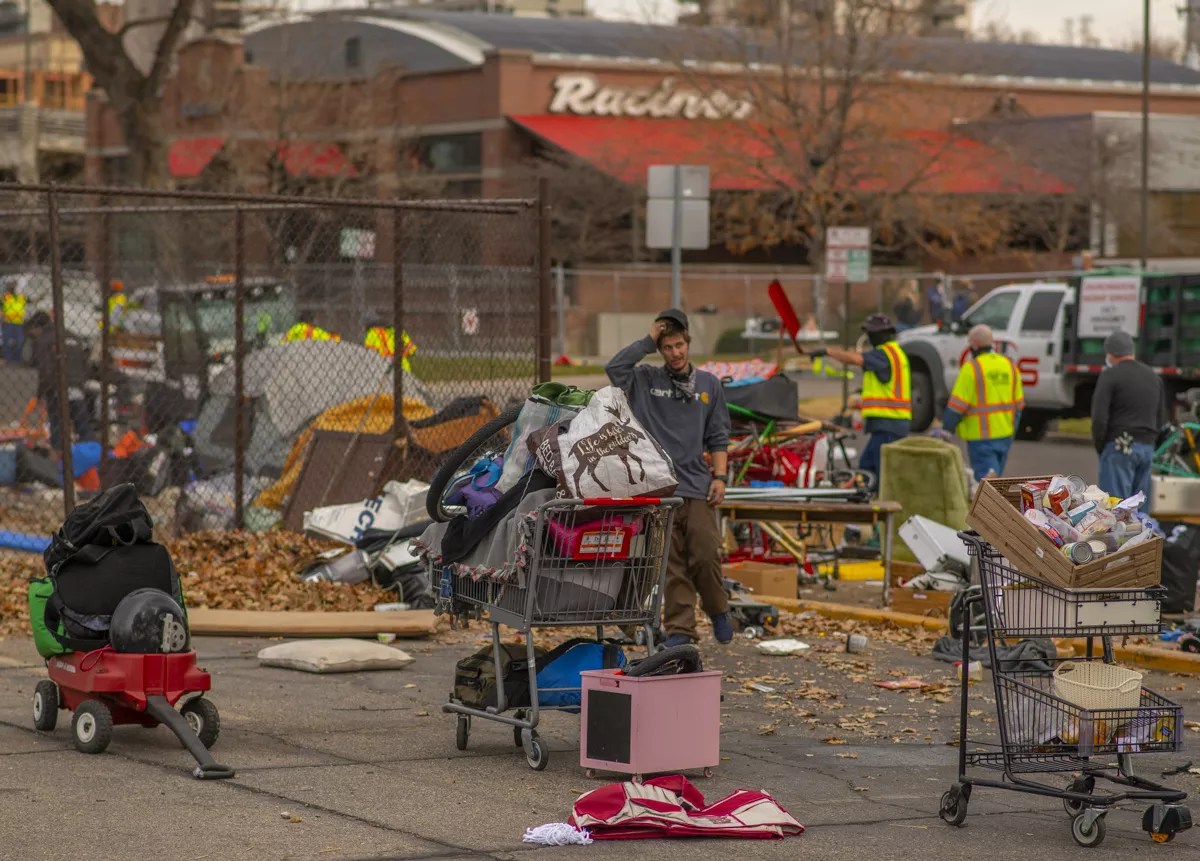
Evan Sem

Audio By Carbonatix
During two days in federal court this week, Denver officials and a group of homeless individuals who’ve sued the city painted vastly different pictures of homeless encampment sweeps during the COVID-19 pandemic.
“I think the presence of encampments is a complex and very difficult issue. I don’t think there’s a clear right and wrong answer in how we handle this complex problem,” Bill Burman, director of Denver Public Health, testified.
The evidentiary hearing stemmed from a lawsuit filed in October by Andy McNulty of Killmer, Lane & Newman LLC on behalf of Denver Homeless Out Loud and ten homeless plaintiffs against the City of Denver, the State of Colorado and a contractor that works with the city on homeless encampment sweeps. The Centers for Disease Control and Prevention advises municipalities not to sweep encampments during the pandemic, to avoid furthering the spread of COVID-19; the plaintiffs want Denver to stop the sweeps for the duration of the pandemic.
At the hearing, McNulty sought to highlight the dangers of sweeps during a pandemic while noting that the City of Denver could use alternative methods to mitigate public-health risks associated with homeless encampments. The City of Denver, meanwhile, argued that it needed to maintain the ability to disperse encampments, since such cleanups are a key tool to its overall work of maintaining public health.
While there was voluminous testimony from numerous witnesses over the two days scheduled for the hearing, Judge William J. Martinez, who is presiding over the case in the U.S. District Court of Colorado, plans to schedule a third day of the evidentiary hearing on an undetermined date in early 2021. Four witnesses for the City of Denver and one for the State of Colorado have not yet testified, and all of the parties involved still need to make closing arguments.
Much of the first two days was taken up by back-and-forth questioning of witnesses by McNulty and attorneys from the Denver City Attorney’s Office, with occasional questions from the Attorney General’s Office to bolster its contention that the state wasn’t involved in decision-making behind the summer sweeps, including one at Lincoln Park in late July, when Colorado State Patrol troopers assisted. An attorney for the private contractor, Environmental Hazmat Services, which was in charge of disposing of materials and/or storing them during the sweeps, rarely spoke.
But plenty of others did: Witnesses included public-health experts, homeless individuals and Denver officials.
While the City of Denver and its witnesses acknowledged that they’ve taken CDC guidance regarding encampments under consideration, they noted that other issues are involved. “We’re having to balance a lot of different factors that are all environmental and public-health considerations in making a decision,” said Danica Lee, director of public-health investigations for the Denver Department of Public Health and Environment.
Lee is one of the key witnesses in the case; her actions during the pandemic go straight to the heart of the lawsuit. In May, Lee emailed a CDC official to determine whether the federal agency’s guidelines had any wiggle room so that Denver could restart the sweeps that it had largely stopped early in the pandemic.
“It seems to be a focal point of this litigation on some level,” McNulty said of the email exchange.
“Clearing encampments or moving people along with no plan for where those people will go is not ideal. However, if encampments are unsafe or unsanitary, then alternate options need to be considered,” Grace Marx, a CDC medical epidemiologist, had written back to Lee.
In court, the City of Denver has argued that this response gave city officials the green light to conduct sweeps, and Lee testified that she believes the city has been compliant with CDC guidelines.
After McNulty finished his cross-examination of Lee, Wendy Shea, an assistant city attorney, sought to highlight limitations imposed on the Denver Department of Public Health and Environment.
Earlier, Marisa Westbrook, a Ph.D. candidate at the University of Colorado Denver who has done research on homeless encampments, had testified that “there are many other opportunities that the city has through public services, social services, to provide the types of resources necessary to people experiencing homelessness.” For example, she suggested, the city could provide port-a-potties and handwashing stations at homeless encampments to mitigate sanitation issues rather than sweep them.
In response, Shea asked Lee: “We keep hearing this ‘Put more trash cans, put more bathrooms.’ Does DDPHE have an unlimited budget?”
“No,” Lee responded.
Also under debate are the dangers of COVID-19 in encampments relative to homeless shelters. One study by Denver Public Health suggests “that there is a lower risk of COVID transmission in encampments than shelters,” according to Denver Public Health’s Burman. However, he added, “it does not definitively show that.”
While Martinez could rule from the bench on the motion for a preliminary injunction in the case following the conclusion of the third hearing day, it’s more likely he will take some time to issue a ruling.
When he does, he could grant the preliminary injunction, ordering that the sweeps stop completely, or that the City of Denver abide by certain requirements in relation to sweeps. Or he could decline to issue the preliminary injunction, and the lawsuit would proceed.